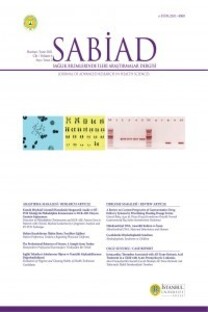Piyasada Satışa Sunulan Sosislerin Mikrobiyolojik Kalitesinin Belirlenmesi
Bu çalışmada, İstanbul ilinde market ve semt pazarlarında satışa sunulan sosis numunelerinin mikrobiyolojik kalitelerinin araştırılması amaçlanmıştır. Bu nedenle ambalajlı ve ambalajsız satılan 150 adet sosis örneği (75 adet ambalajlı, 75 adet ambalajsız) toplanmıştır. Örnekler Toplam Mezofil Aerob Bakteri (TMAB), Koliform, Escherichia coli (E.coli), Staphylococcus aureus (S.aureus), Anaerob sporlu bakteri ve küf-maya sayısı ve Salmonella spp. varlığı yönünden incelenmiştir. Ayrıca örneklerin pH düzeyleri de belirlenmiştir. Çalışmamızın sonucunda, ambalajsız olarak satışa sunulan sosislerin mikrobiyolojik kalitelerinin iyi durumda olmadığı, 2 numunenin Salmonella içermesinden dolayı Türk Gıda Kodeksine (TGK) uymadığı ve bundan dolayı halk sağlığını tehdit edebileceği, ambalajlı ürünlerin ise daha iyi durumda olduğu değerlendirilmiştir.
Anahtar Kelimeler:
: Sosis, Salmonella, Escherichia coli, Staphylococcus aureus, Koliform
Effect of Seminal Plasma and Pre-cooling Addition of Glycerol during Freezing of Ram Semen on Spermatological Characteristics
In this study, it was aimed to investigate the microbiological qualities of sausage samples which are offered for sale in the market of Istanbul. For this purpose, a total 150 samples of sausages, 75 packed and 75 unpackaged were collected. Examples Total Mesophilic Aerob Bacteria (TMAB), Coliform, Escherichia coli (E.coli), Staphylococcus aureus (S.aureus), Anaerob spores bacteria and number of yeasts and Salmonella spp. have been examined for their existence. The pH levels of the samples were also determined. At the end of the study, 2 of unpackaged samples existed Salmonella were not in compliance with the Turkish Food Codex. When the study is taken into account as a whole, findings indicate that samples can cause to bad effects for public health. On the other hand, it is clear that packaged products have better quality compared to unpackaged ones
Keywords:
Sausage, Salmonella, Escherichia coli, Staphylococcus aureus, Coliform,
___
- Aksu H.A., Ö.Ö., Aydın A., Uğur M. (1999): E. coli O157:H7’nin hayvansal kökenli gıda maddelerinde varlığı, Pendik Veteriner Mikrobiyoloji Dergisi, 30: 77-81.
- Andrews W.H., June G.A., Sherrod P.S., Hammack T.S., Amaguana R.M. (1995): Food And Drug Administration Bacteriological Analytical Manual, 5.01–5.20, 8th edition, AOAC International, Gaithersburg, United States of America.
- AOAC (1984): Official Methods For Chemical Analysis, Association of Analytical Chemists.
- Apaydın G., Ceylan Z.G., Atasever M., Kaya M. (2008): Vakum Uygulanarak Ambalajlanmış Sosislerin Mikrobiyolojik ve Kimyasal Özellikleri, Atatürk Üniversitesi, Ziraat Fakültesi Dergisi, 39 (1), 109-113, ISSN : 1300-9036.
- Bingöl E.B. (2003): Sodyum Laktatın Sosislerin Mikrobiyolojik Kalitesi ve Raf Ömrü Üzerine Etkisi. Yüksek Lisans Tezi, İstanbul Üniversitesi Sağlık Bilimleri Enstitüsü, Gıda Hijyeni ve Teknolojisi Anabilim Dalı, İstanbul.
- Blickstad K., Molin G. (1983): The microbial flora of smoked pork loin and frankfurter sausage stored in different gas atmospheres at 4°C, Journal of Applied Bacteriology, 54: 45-56.
- Blickstad E., Molin G. (1983): Carbon dioxide as a controller of the spoilage flora of pork, with special reference to temperature and sodium chloride, Journal Food Protect, 46: 756-763.
- Coia J.E., Johnstan Y., Steers N.J., Hanson M.F., (2001): A survey of the prevalance of E. coli O157 in raw meats, raw cow’s milk and raw-milk cheeses in south-east Scotland, International Journal Food Microbiology, 66: 63-69.
- Coşkun F., Yılmaz İ., Demirci A.Ş., (2015): The Microbiological Quality of Frankfurters Sold in Tekirdag, Journal of Tekirdag Agricultural Faculty,12:1.
- Cutter C.N. (2006): Opportunities for bio-based packaging technologies to improve the quality and safety of fresh and further processed muscle foods, Meat Science, 74: 131-142.
- Dontorou C., Papadopoulou C., Filiousis G., Economou V., Apostolou I., Zakkas G., Salamoura A., Kansouzidou A., Levidiotou S. (2003): Isolation of Escherichia coli O157:H7 from foods in Greece, International Journal of Food Microbiology, 82: 273–279.
- Flemmig R., Stojanowic V. (1986): Untersuchııngen an vorverpacktem Brühwurstaufschnitt aus dem Handel, Flcischwirtsch. 66 (6):994-998.
- Güngör E., Gökoğlu N. (2010): Determination of microbial contamination sources at a Frankfurter sausage processing line, Turk Journal Veterinary Animal Sciences, 34(1): 53-59, Tubitak doi:10.3906/vet-0805-28.
- Güven A., Patır B. (1998): Elazığ ilinde tüketime sunulan et ve bazı et ürünlerinde listeria türlerinin araştırılması, Turk Journal Veterinary Animal Sciences, 22: 205-212.
- Harrigan W.F. (1998): Laboratory Methods İn Food Microbiology, Academic Press., London.
- ICMSF. (1982): Their Significance and Methods of Enumeration International commission on microbiological specifications for foods, Microorganism in Foods, London University to Toronto Press.
- ISO 16649-2,07/2001. Microbiology Of Food And Animal Feeding Stuff.
- İnal T. (1992): Besin Hijyeni (Hayvansal Gıdaların Sağlık Kontrolü), 2.basım, Final Ofset, İstanbul.
- Kahraman T., Nazlı B., Ergün Ö. (2006): Elektrik Stimülasyonunun Et Kalitesi Üzerine Etkileri, İstanbul Üniversitesi Veteriner Fakültesi Dergisi Yayınları, 2006:2.
- Laleye L.C., Lee B.H., Simard R.E., Carmichael L., Holley R.A., (1984): Shelf life of vacuum or nitrogen packed pastrami: Effects of packaging atmospheres, temperature and duration of storage on microflora changes, Journal Food Science, 49:827-831.
- Levine P., Rose B., Green S., Ransom G., Hill W. (2001): Pathogen testing of ready-to-eat meat and poultry products collected at federally inspected establishments in the United States, 1990 to 1999, Journal of Food Protection, 64(8): 1188-1193.
- Özdemir H. (1997): Vakumlu paketlenmiş sosislerde mikrobiyal floranın gelişimi, Ankara Üniversitesi Veteriner Fakültesi Dergisi, 44: 127-36.
- Silla H., Simonsen B., (1985): Shelf life of cured, cooked and sliced meat products. Fleischwirtsch, 65:66-69.
- Tavechio A.T., Ghilardi A.C., Peresi J.T., Fuzihara T.O., Yonamine E.K., Jakabi M., Fernandes S.A. (2000): Salmonella serotypes isolated from nonhuman in Sao Paulo, Brazil, from 1996 through, Journal of Food Protection, 65(6): 1041-1044.
- Türk Gıda Kodeksi (TGK), (2009): Mikrobiyolojik Kriterler Tebliği, Gıda Tarım ve Hayvancılık Bakanlığı, Tebliğ no: 2009/6, Ankara.
- Üçüncü M. (2007): Gıdaların Ambalajlanması, Ege Üniversitesi Basımevi, 733-787p., İzmir.
- Yörük N.G., Güner A. (2017): Control of fermented sausage, salami, sausage and hamburger meatballs produced in meat production facilities applying the ISO Food Security System for food pathogens, Turkish Journal of Veterinary and Animal Sciences, 41:337-344.
- Yayın Aralığı: Yılda 3 Sayı
- Başlangıç: 2018
- Yayıncı: İstanbul Üniversitesi
Sayıdaki Diğer Makaleler
Piyasada Satışa Sunulan Sosislerin Mikrobiyolojik Kalitesinin Belirlenmesi
Hastalıklar ve Antik DNA: Dün ve Bugün
Ezgi Gizem BERKAY, Can Veysel ŞOROĞLU, Burçak VURAL
Adölesanlarda Sık Görülen Jinekolojik Sorunlar
Türkiye’de Yanık Tedavisinde Geleneksel Olarak Kullanılan Bitkiler
